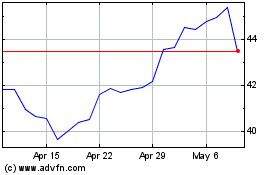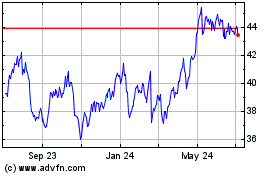U.K. Banks Ordered to Provide Customers Better Deal
August 09 2016 - 6:00AM
Dow Jones News
LONDON—Banks in the U.K. could lose around £ 1 billion ($1.3
billion) in annual revenue under new measures designed to give
retail customers more choices and better deals.
Customers will also be encouraged to share personal data,
including records of their banking transactions, over digital
applications designed to scout out the best banking deals.
For years, Britain has been trying to foster greater competition
in retail banking and small business lending. However despite more
banks springing up, customers have stubbornly stuck with a handful
of lenders.
Unarranged overdraft charges, or fees for customers going into
debit on their accounts without permission, will be all but stamped
out under an order from the country's Competition and Markets
Authority. Banks currently make around £ 1.2 billion a year from
such charges, accounting for around one-third of their retail
revenue, the CMA said.
The new rules require banks to send alerts to customers when
their account dips below zero and to give them a grace period to
avoid charges. Banks will also have to set a monthly cap on
unarranged charges.
"We are breaking down the barriers which have made it too easy
for established banks to hold on to their customers," said Alasdair
Smith, chairman of the retail banking investigation.
The plan around overdraft charges had been announced when the
CMA made provisional findings on the sector's competition in May.
Analysts said banks would have to work harder to make fees from
retail customers but said it shouldn't have a big effect on the
sector's profits.
The measures are part of reforms announced Tuesday to shake up a
sector largely controlled by five lenders—Barclays PLC, HSBC
Holdings PLC, Royal Bank of Scotland Group PLC, Lloyds Banking
Group PLC and Santander UK. The banks house most of the country's
checking accounts and provide the bulk of mortgages and small
business loans.
The banks's major lobbying group, the BBA, said the sector is
already competitive and the plan for cross-sector digital apps will
further help customers find the best products.
Switching checking accounts is rare over a customer's lifetime,
largely because most of the U.K.'s banks offer "free in credit"
banking, meaning customers typically don't pay fees as long as they
have money in their accounts.
At the moment only 3% of personal customers and 4% of business
ones switch to a different bank in any year.
Some of the country's smaller banks said the CMA's
recommendations are too tame and won't make major inroads on the
current oligopoly.
"The CMA was given a rare opportunity to support and develop
competition in banking, it is disappointing that they decided not
to get at the root of the problem, but rather they missed the point
and tinkered around the edges," said Craig Donaldson, chief
executive officer at Metro Bank.
Ian Walker contributed to this article.
Write to Margot Patrick at margot.patrick@wsj.com
(END) Dow Jones Newswires
August 09, 2016 05:45 ET (09:45 GMT)
Copyright (c) 2016 Dow Jones & Company, Inc.
HSBC (NYSE:HSBC)
Historical Stock Chart
From Mar 2024 to Apr 2024

HSBC (NYSE:HSBC)
Historical Stock Chart
From Apr 2023 to Apr 2024
